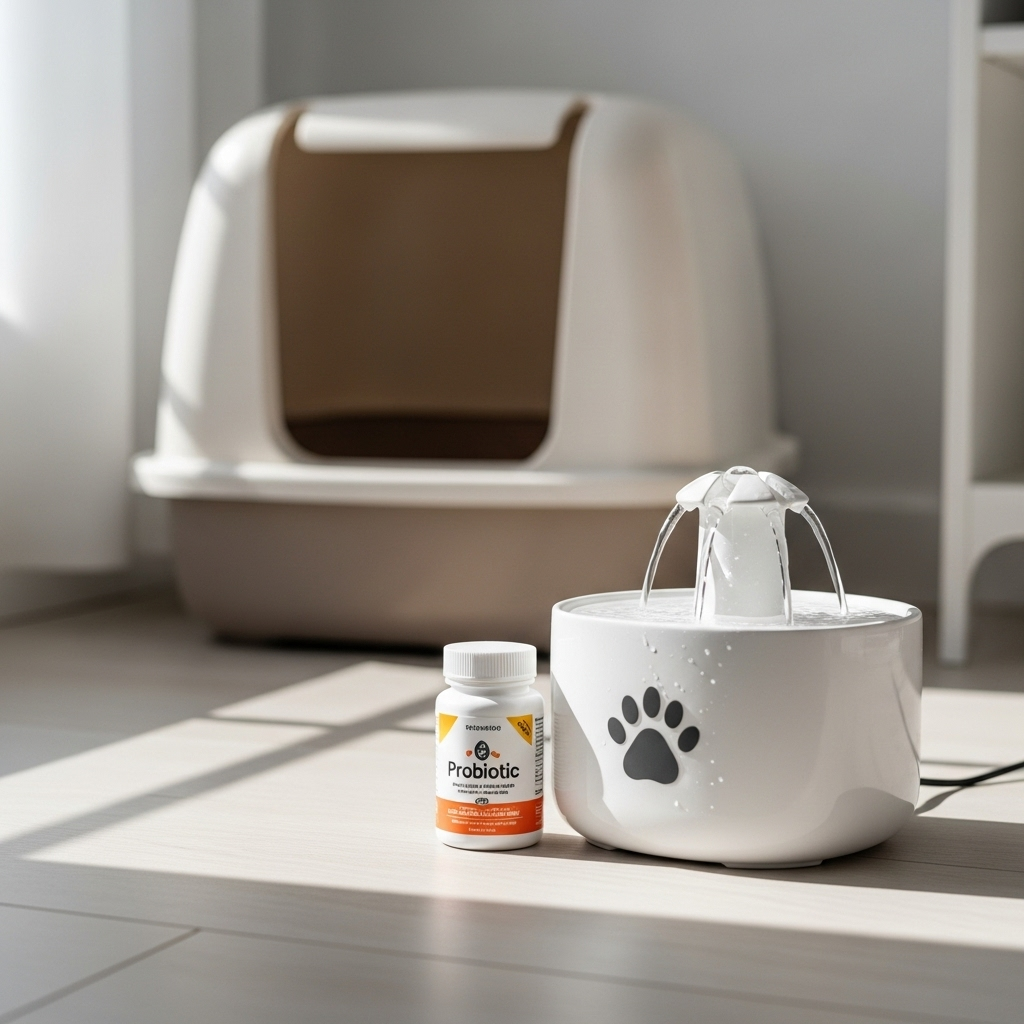Choosing Probiotics for Constipation-Prone Cats

Constipation in cats is a common and frustrating problem for pet owners. In recent years probiotic supplements have become a popular non-prescription option to support digestive health and regularity. This guide explains what probiotics are, how they might help cats with constipation, how to choose a safe product, and when to see your veterinarian.
What are probiotics and how could they help constipated cats?
Probiotics are live microorganisms—usually bacteria or yeasts—that, when given in adequate amounts, may provide health benefits by influencing the gut microbiome. For cats with mild, intermittent constipation, probiotics may help by:
- Supporting a balanced gut microbial community that can influence gut motility and stool consistency.
- Reducing minor inflammation in the gut that can slow transit time.
- Producing short-chain fatty acids and other metabolites that may promote healthy intestinal function.
Scientific evidence in cats is limited compared with humans and dogs, but some clinical reports and trials suggest select probiotics can help certain gastrointestinal issues. Probiotics are not a guaranteed cure for constipation, especially when caused by mechanical obstruction, megacolon, severe dehydration, or neurological problems.
Which probiotic strains are commonly used for cats?
Pet-specific probiotic products often contain strains chosen for safety and survivability. Common strains include:
- Lactobacillus species (e.g., L. acidophilus)
- Bifidobacterium species
- Enterococcus faecium
- Bacillus coagulans (a spore-forming genus)
- Saccharomyces boulardii (a beneficial yeast more often used for diarrhea)
Look for products formulated for cats or labeled as safe for cats. Avoid human supplements that contain sweeteners like xylitol, flavors, or other additives that could be harmful.
How to choose a probiotic for a constipation-prone cat
- Cat-specific formulation: Choose products made for cats or labeled for feline use.
- Known strains and CFU count: The label should list the strains and the colony forming units (CFU) per dose. Typical feline probiotic doses vary widely—follow the product label or your veterinarian’s recommendation.
- Quality and shelf-stability: Check manufacturing information, expiration date, and storage instructions (some require refrigeration).
- Single-strain vs multi-strain: Both can be effective. Multi-strain products may target different mechanisms but single-strain products can be simpler to evaluate.
- Avoid harmful additives: No xylitol, artificial sweeteners, or toxic flavors.
- Consult your veterinarian: Especially if your cat is on medications, has a serious illness, or is immunocompromised.
Forms and administration tips
Probiotics come as powders, capsules, chewables, paste, or included in certain diets. For picky eaters, sprinkle powder or open a capsule over moist food. Start with the manufacturer’s recommended dose and observe for 5–14 days. If your cat refuses or develops adverse signs, stop and consult your vet.
Other practical measures to relieve constipation
Probiotics are one tool and often work best alongside lifestyle and dietary changes:
- Improve hydration: wet food, extra bowls, or a cat water fountain.
- Increase fiber mildly: some cats respond to canned pumpkin or veterinarian-recommended fiber supplements—but fiber can sometimes worsen obstruction, so consult your vet.
- Regular grooming and hairball control to reduce fur ingestion.
- Exercise and environmental enrichment to stimulate intestinal motility.
- Prompt veterinary care for chronic or severe constipation; your vet may recommend stool softeners, laxatives, enemas (performed by a professional), or treatment for megacolon.
Safety, side effects, and when to contact a vet
Probiotics are generally well tolerated. Mild transient side effects can include soft stools, increased gas, or mild vomiting. Stop the supplement and contact your veterinarian if you notice:
- Persistent vomiting or diarrhea
- Worsening constipation or inability to defecate
- Signs of systemic illness (lethargy, loss of appetite, dehydration)
- Any signs of allergic reaction
Avoid probiotics in animals with severe immune compromise unless directed by a veterinarian, as live organisms may pose theoretical risks in rare cases.
Pros and Cons
| Pros | Cons |
|---|---|
| May support gut health and improve mild constipation | Not guaranteed to work; evidence in cats is limited |
| Generally safe and easy to give (food toppers, powders) | Possible mild side effects (gas, soft stool, vomiting) |
| Can be used alongside diet and hydration strategies | Products vary in quality; some human formulations are unsafe for cats |
FAQ
Can probiotics cure my cat’s constipation?
No—probiotics can help some cats with mild, functional constipation by supporting gut health, but they are not a guaranteed cure. Underlying causes like megacolon, obstruction, or dehydration require veterinary treatment.
How long until I see improvement?
Some owners notice subtle changes in 5–14 days, but it may take longer. If there is no improvement or symptoms worsen within a week or two, contact your veterinarian.
Are human probiotics safe for cats?
Not always. Human products may contain flavors, sweeteners, or ingredient levels unsuitable for cats. Choose a product labeled for feline use or ask your veterinarian which human products, if any, are safe.
Can I give probiotics with antibiotics?
Yes, but timing matters: give probiotics a few hours after the antibiotic dose to improve the chance the probiotic survives. Discuss appropriate strains and timing with your veterinarian.
Key Takeaways
- Probiotics may help some constipation-prone cats but are not a universal cure.
- Choose cat-specific products with known strains and follow dosing instructions or your vet’s advice.
- Combine probiotics with hydration, dietary adjustments, grooming, and activity for best results.
- Stop and seek veterinary care if your cat shows severe signs, persistent vomiting, or cannot defecate.
- Always consult your veterinarian before starting supplements, especially for cats with chronic issues or other medical conditions.
Disclaimer
This article provides general information about probiotics and constipation in cats and is not a substitute for professional veterinary advice. If your cat is constipated, lethargic, vomiting, in obvious pain, or shows any concerning signs, contact your veterinarian promptly. Use supplements only under veterinary guidance when your cat has underlying health conditions.

Leave a Reply